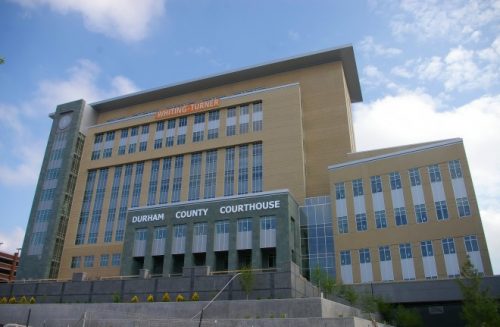

By Daphne Ho
DURHAM, NC – The Durham County District Attorney’s Office and the Wilson Center for Science and Justice at Duke Law last Tuesday released a one-year report from their collaborative research project regarding plea bargaining, identifying “how prosecutors weigh pleas and how the process results in changes to initial charges and the final sentences imposed.”
This research study, titled the “Plea Bargain Project,” was conducted for over a year. The scope of the project included “collect(ing) and analyz(ing) information from more than 300 Superior Court cases and more than 1,800 felony and misdemeanor charges disposed between April 2021 and April 2022 in Durham County, N.C.”
Kevin Dahaghi, a Duke Law postdoctoral fellow, is the lead writer of the research report who is currently “working on further analyses of the data.” His continual work will be updated in Stanford Law Review.
District Attorney Satana Deberry said the DA’s office “hopes to better understand how felony cases are resolved, identify disparities in those resolutions, and bring more transparency to the process,” and for prosecutors “the plea process is our biggest opportunity to use our discretion to create a more equitable system.”
She adds the project “is an important tool for ensuring our case resolutions are equitable, consistent, and tailored to address the root causes of criminal behavior. We are proud to have invested in this data collection work, which has already shed new light on how to achieve public safety, fairness, and justice for our Durham community.”
The authors said the project “breaks new ground in opening up a historically opaque system” and “provides insights on how the plea process results in changes to charges and to final sentences imposed,” noting past research has been difficult due to lack of documentation, because “available court data does not reflect what happened during the negotiations.”
Brandon L. Garrett, faculty director of the Wilson Center, said, “We hope that what Durham has done provides a model for other offices… The leadership demonstrated by District Attorney Deberry during this year of impactful work shows that it is feasible and valuable to track pleas. We believe that this type of plea tracking should be the national standard practice.”
One of the main researchers includes Catherine Grodensky, a PhD candidate in the Sanford School of Public Policy at Duke. She interviewed many of the prosecutors and “studied their priorities and practices concerning plea bargaining.”
Grodensky is currently conducting “a second round of qualitative interviews.” When asked about the project, she states, “I was so grateful for the opportunity to have conversations with each of the prosecutors and explore the culture and policies of the Office.”
Key facts about the plea system that interested researchers, the study notes, included “almost 90 percent of cases initially indicted as felonies resulted in a guilty plea to a felony… about three-fourths of cases had at least one charge dismissed during the process and nearly half had charges reduced.”
The report added, “Prosecutors discussed terms of pleas with victims in the vast majority of cases. About a quarter of the cases involved violent crimes.”
The project also includes, “The most common offenses included drugs, larceny, and robbery. The most commonly pleaded charge was possession of a firearm by a convicted felon. Approximately 60 percent of cases studied involved a person victim, and about two-thirds of victims knew the defendant in their case.”
Part of the research involved asking prosecutors “to consider what reasons supported their decisions,” and this discussion resulted in their “consider(ing) both aggravating factors, which would call for a more severe sentence, and mitigating factors, which would call for a more lenient result, in each case.”
Assistant District Attorney Daniel Spiegel, described in the report as a key individual that “led implementation of the initiative in the office as policy counsel” had stated, “Reporting cases to the Plea Tracker causes prosecutors to pause, reflect on their decisions, and in turn, check implicit biases.”
Spiegel added, “Tracking our pleas means holding ourselves accountable for the ways we use our discretion, creating transparency both within the office and with the public we serve.”
Some key findings from the report included, “Felony cases included more aggravating than mitigating factors per case. Prosecutors reported that public safety factors, like presence of a firearm and severity of the offense, were commonly very important in negotiations, while the most common mitigating factors were limited criminal history, substance abuse, and age.”
Another project finding was, “Collateral consequences of a conviction, including health and community consequences, were considered in two-thirds of cases.”
And, the report said, “Across all racial groups and gender categories, a person’s criminal record and the seriousness of the offense were the most cited factors. However, more mitigating factors were considered in cases with White people and more aggravating factors in cases with Black people.”
Finally, the report found, “Prosecutors reported communicating with the defense about three-quarters of the time before making an initial offer. In more than a third of cases, defense attorneys provided mitigating evidence to support a more lenient sentence before prosecutors made their initial offer; such evidence had at least some influence on the final charges in the vast majority of those cases.”
The report highlights how “the role of the defense in plea negotiations also stood out as extremely important in the plea process.”
An important focus of the research, according to the report, regarded “conditions of supervision, present in about three-quarters of cases, with no-contact orders, mental health stipulations, and anger management training most common in violent crime cases, and in nonviolent cases, orders for substance abuse assessment and treatment and Cognitive Behavioral Interventions (CBI).”
